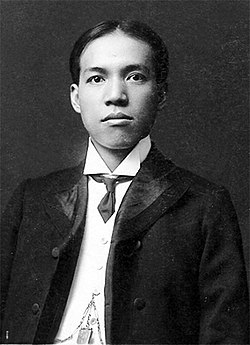Liang Kiĉao
Liang Kiĉao aŭ Liang Qichao (en ĉina 梁啟超 Liang Ĉ'i-ĉ'ao; 23a de februaro 1873 – 19a de januaro 1929), socia persona nomo Zhuoru, pseŭdonimo Rengong, estis ĉina fakulo, ĵurnalisto, filozofo kaj reformisto kiu vivis dum la fino de la Dinastio Qing kaj komenco de la Respubliko. Li inspiris ĉinajn fakulojn per siaj verkoj kaj reformismaj movadoj.[1] Li estis apoganto de la konstitucia monarkio.
| Liang Kiĉao | ||
|---|---|---|

| ||
| Persona informo | ||
| 梁啟超 | ||
| Naskiĝo | 23-an de februaro 1873 en Huicheng Subdistrict | |
| Morto | 19-an de januaro 1929 (55-jaraĝa) en Peking Union Medical College Hospital | |
| Tombo | Tomb of Liang Qichao (en) | |
| Religio | Konfuceismo vd | |
| Lingvoj | ĉina vd | |
| Ŝtataneco | Respubliko Ĉinio (1912–1929) Dinastio Qing (1873–1912) | |
| Alma mater | Nacia Universitato Tsing Hua | |
| Partio | Democratic Party (en) | |
Subskribo 
| ||
| Familio | ||
| Patro | Liang Baoying (en) | |
| Infanoj | Liang Sicheng (en) | |
| Profesio | ||
| Okupo | tradukisto politikisto revoluciulo edukisto verkisto filozofo historiisto ĵurnalisto socia aktivisto | |
| Laborkampo | Historio kaj historiisto | |
| Aktiva en | Pekino • Popola Respubliko Ĉinio vd | |
| Doktoreca konsilisto | Kang Yuwei vd | |
| vd | Fonto: Vikidatumoj | |

Referencoj
redaktiLiteraturo
redakti- Chang, Hao. Liang Ch'i-Ch'ao and Intellectual Transition in China. London: Oxford University Press, 1971.
- Chen, Chun-chi. Politics and the novel: a study of Liang Ch'i-Ch'ao's future of New China and his views on fiction. Ann Arbor: UMI dissertation services, 1998.
- Huang, Philip: Liang Ch’i-ch’ao and Modern Chinese Liberalism (1972). Seattle and London: University of Washington Press.
- Kovach, Bill and Rosenstiel, Tom. The Elements of Journalism. New York: Random House, 2001.
- Levenson, Joseph. Liang Ch'i-Ch'ao and the Mind of Modern China. Los Angeles: University of California Press, 1970.
- Li Xiaodong [李暁東]: Kindai Chūgoku no rikken kōsō – Gen Puku, Yō Do, Ryō Keichō to Meiji keimō shisō [近代中国の立憲構想-厳復・楊度・梁啓超と明治啓蒙思想] (2005). Tokio: Hōsei daigaku shuppankyoku.
- Li Xisuo [李喜所] (eld.): Liang Qichao yu jindai zhongguo shehui wenhua [梁启超与近代中国社会文化] (2005). Tianjin: Tianjin guji chubanshe.
- Shin, Tim Sung Wook. The concepts of state (kuo-chia) and people (min) in the late Ch'ing, 1890 - 1907: the Case of Liang Ch'i Ch'ao, T'an S'su-t'ung and Huang Tsun-Hsien. Ann Arbor: University Microfilms International, 1986.
- Tang, Xiaobing. Global space and the Nationalist Discourse of Modernity" the Historical Thinking of Liang Qichao. Stanford: Stanford University Press, 1996.
- Wang, Xunmin. Liang Qichao zhuan. Beijing: Tuan jie chu ban she, 1998.
- Wu, Qichang. Liang Qichao zhuan. Beijing: Tuan jie chu ban she, 2004.
- Xiao, Xiaoxui. China encounters Western ideas (1895 - 1905): a rhetorical analysis of Yan Fu, Tan Sitong and Liang Qichao. Ann Arbor: UMI dissertation services, 1992.
- Yang Gang [杨钢] kaj Wang Xiangyi [王相宜] (ed.): Liang Qichao quanji [梁启超全集] (1999). Beijing: Beijing chubanshe. (dates of letter before mid 1912 messed up).
- Xiao, Yang. Liang Qichao’s Political and Social Philosophy, in Chung-ying Cheng, Nicholas Bunnin (eds.), Contemporary Chinese Philosophy (Malden: Blackwell), 2002, pp. 17–36.
Kromaj legadoj
redakti- Pankaj Mishra. (2012) “Liang Qichao's China and the Fate of Asia”, From the Ruins of Empire:The Intellectuals Who Remade Asia. Nov-Jorko: Farrar, Straus and Giroux. ISBN 0374249598.
- Liang Chi-chao (Liang Qichao) 梁啟超 Arkivigite je 2015-04-27 per la retarkivo Wayback Machine el Biographies of Prominent Chinese ĉ. 1925.
Eksteraj ligiloj
redakti- CCTV artikolo pri la Ĉina Revolucio
- Book Review: Liang Ch’i-ch’ao and the Mind of Modern China Arkivigite je 2004-11-04 per la retarkivo Wayback Machine
- Liang's former residence in Xinhui, Guangdong province (foto) Arkivigite je 2005-09-16 per la retarkivo Wayback Machine
- Demokratio en Ĉinio
- Kang Youwei-Liang Arkivigite je 2004-10-26 per la retarkivo Wayback Machine instruisto
- Memorial hall for Liang Qichao at his former residence in north China's Tianjin City (foto)

